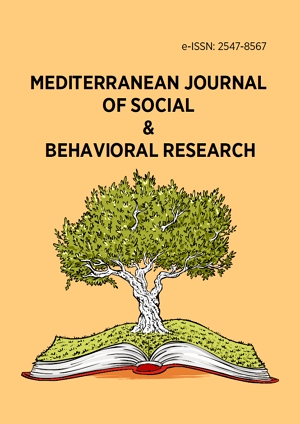Research Article
Teaching Students with Low Academic Achievement in Reading Through Multisensory Approach – Intervention Programme
More Detail
1 Ministry of Education, Batina South Directorate, Human Resources Department, OMAN* Corresponding Author
Mediterranean Journal of Social & Behavioral Research, 3(1), February 2019, 3-7, https://doi.org/10.30935/mjosbr/9587
Published: 01 April 2019
OPEN ACCESS 1837 Views 1318 Downloads
ABSTRACT
Jolly Phonics is a multisensory approachdesigned to teach children how to read, write and spell using a systematic multisensory phonics program. It uses synthetic phonics method. In this programme children learn the letter sounds first and then move on to blending [putting together] the sounds in order to read words. Jolly Phonics was developed for children from junior kindergarten to grade 2. It can be used for children who have reading/ writing difficulties. The researchers have noticed, while working as supervisors in Cycle One Omani schools, that grade threestudents have certain weaknesses in reading. They realized that some students could not even read simple words though they have spent 2 years and a halfstudying English.In order to investigate this problem, six low achievers students from grade 3 were selected; they were males and females and their age is between 8-9 years old. A certain scheme was designed; it included teaching one lesson a week for 4 months using Jolly Phonics programme. The teacher was provided by the Jolly Phonics materials to help her teaching the lessons effectively. The programme included learning the letter sounds, learning the letter formation, blending, identifying sounds in words and spelling the tricky words. A certain exam has been given to the students before and after the programme. The results show that there is a noticeable improvement in the students' academic achievement comparing with their previous level. The presentation will be interactive, researcher and audience together will explore to what extent this programme has certain effectiveness on students’ performance. Findings will be set beside those from previous studies, implications for the Omani classroom will be discussed, and recommendations made for future research. Excerpts from students reading and writing will be shared with the audience.
CITATION (APA)
Al-Shabibi, S. R., & Al-Shaqsi, M. K. (2019). Teaching Students with Low Academic Achievement in Reading Through Multisensory Approach – Intervention Programme. Mediterranean Journal of Social & Behavioral Research, 3(1), 3-7. https://doi.org/10.30935/mjosbr/9587
REFERENCES
- Adams, M. J. (1990). Beginning to read: Thinking and learning about print. Cambridge, MA. MIT.
- Al–Ghafri, S. (2009). The effectiveness of the Learning Difficulties Programme in Basic Education Cycle 1 schools. Ministry of Education. Sultanate of Oman.
- Al-Mamari, F. (2012). Effect Synthetic Phonics Instruction on Early Reading Skills of Grade One Students in Oman. Published Master’s Thesis, Sultan Qaboos University Oman.
- Dahlgren, R., & Boulware-Gooden, R. (2002). Teaching reading in an inner city school through a multisensory approach. Annals of Dyslexia, 52, 229-242.
- Greenwood, C. R., Delquadri, J., & Hall, R. V. (1984). Opportunity to respond and student academic performance. In W. L. Heward, T. E. Heron, J. Trapp-Paper, D. S. Hill (Eds.) Focus on behavior analysis in education. Columus. OH: Charles Merrill.
- Gutman, L. & McLovd, V. (2000). Parents’ Management of their Children’s Education within the Home, at School, and in the Community: An Examination of African-Amirican Families Living in Poverty. The Urban Review, 32, 1-24.
- Johnston, R. & Watson, J. (2004). Accelerating the development of reading, spelling and phonemic awareness skills in initial readers. Reading and Writing, 17(4), 327-357.
- Latha, R. (2005). A Reading Programme for Elementary Schools. English Teaching Forum, 14(1), 18-23.
- Lloyd, S. (1998). The Phonics Handbook. Essex, UK: Jolly Learning Ltd.
- Mival, E. (1997). Using Jolly Phonics: A guide for teaching reading and writing. Essex, UK: Jolly Learning Ltd.
- Pressley, M., & Hilden, K. (2006). Cognitive strategies. In W. Damon & R. M. Learner (Eds-in-Chief) & R. Siegler (Vol. Eds), Handbook of Child Psychology: Vol.2.
- Stewart, E. D. (2011). The impact of systematic multisensory phonics instructional design on the decoding skills of struggling readers. Walden University. ProQuest Dissertations and Theses.
- http://www.ehow.com/info_8742280_homemade-phonics-games
- https://www.wordsforlife.org.uk
- http://search.proquest.com/docview/225382153?accountid=27575
- http://search.proquest.com/docview/856900916?accountid=27575
- http://learninghelp.org.au/multi-sensory-approaches-to-teaching/

 The articles published in this journal are licensed under the CC-BY Creative Commons Attribution International License.
The articles published in this journal are licensed under the CC-BY Creative Commons Attribution International License.